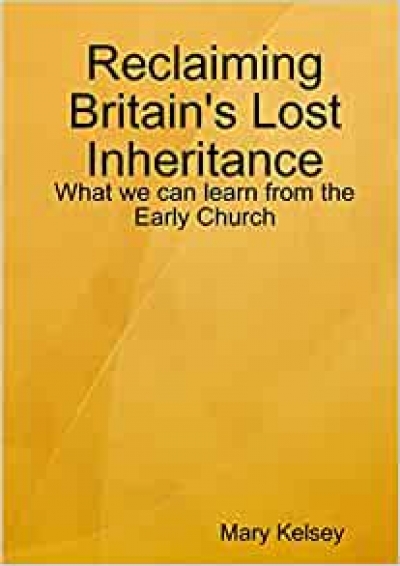There is much to learn from the early Church in Britain. That is the theme of this excellent little book. Britain has a lost spiritual inheritance, with rich deposits covered by centuries of the silt of political religion, denominational rifts, and strata upon strata of tradition. This book is a good place to start our search.
Background
Mary Kelsey had a career in teaching biology and environmental sciences before taking to writing about topical subjects from a biblical perspective. In this book she discusses the early Church in Britain, referring the reader to 37 further publications by a variety of authors, to facilitate a search for this buried treasure. The book’s purpose is clearly stated – “to bring a better understanding and revelation to Christians concerning the roots of our faith...”
Cataclysm and decline
‘Reclaiming Britain’s Lost Inheritance’ is a concise, 140-page introduction – a starter rather than an academic study – to this spiritual treasure hunt. It covers the early missionaries to Britain in the first seven centuries after Christ and includes details about Celtic Christianity, referring to around twenty saints of Ireland, Wales, Northumbria and Cornwall.
The early Church in Britain was characterised by passion, prayer and power. As the author says, the Celts “were relational rather than rational, inspirational rather than institutional".
The central chapters deal with the cataclysm of The Synod of Whitby (7th century) and the political imposition of the Roman Church. This is described alongside the theological controversies of the following centuries. After the 7th century, the decline involved an increasing deviation from Scripture and from early Church doctrine, resulting in an altered nature, form and identity of the Church in Britain thereafter.
Passion, prayer and power
We look back through a history that is coloured by the filter of denominationalism, hierarchies, Archbishops and Moderators. The Celtic Church had none of that. Rather, the early Church in Britain was characterised by passion, prayer and power. As the author says, the Celts “were relational rather than rational, inspirational rather than institutional.”
It could be said that, over these mists of time, traditional observance has replaced the intimacy of the Celtic saint (a ‘saint’ being the average Celtic believer). The Celtic Church was also missional across both the British Isles and the continent of Europe.
Romanticising the Celts
Latter chapters look at modern Celtic communities. These, sadly, appear to have the trappings and romanticism of the ancient Celtic Church without its mission and passion. Some modern expressions of Celtic-styled organisations use the image of the wild goose to refer to the Holy Spirit (the original Hebrew, Ruach, meaning breath or wind or Spirit). Any bird is a poor image for a Person of the Trinity whose influence and power encircles the earth.
Despite Corinthian excesses, almost certainly present in the British Church of those early centuries, Paul also taught them to use the breakthrough tools of spiritual gifts.
Our chief inheritance is not the nostalgia, nor the romance of Celtic Church history. Rather, our true inheritance from the Celts is their example, and the encouragement they provide to seek our Lord’s grace and match their courage, prayer and mission. We would also do well to practise the relational nature of this early British Church.
In God, we also have opportunity to imitate their breakthrough power of signs and wonders, just as Paul exhorted the Corinthian Church to imitate him and break through their city’s pagan culture. Despite Corinthian excesses, almost certainly present in the British Church of those early centuries, Paul also taught them to use the breakthrough tools of spiritual gifts.
Obvious strengths
While clearly far from perfect (an aspect that this somewhat selective perspective downplays), the early Church had several major strengths compared to todays. It was, arguably, closer to Scripture’s Hebraic roots, had more of the fear of God, and enjoyed a closer intimacy with him, which derived from constant prayer. And, as the author concludes, that early British Church had a better “understanding of the continuous word of God from Genesis to Revelation”.
This is a handy little reference book – its bibliography alone making it a useful study resource.
‘Reclaiming Britain’s Lost Inheritance’ (152 pp) is self-published, and is available from lulu.com for £8.99 + p&p.





